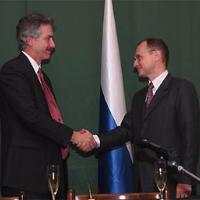On May 6, during Russian President Vladmir Putin's last day in office, the American and Russian governments finally signed their long-sought civil nuclear energy agreement. The accord facilitates the transfer of technologies, materials, equipment and other components used to conduct nuclear research and produce nuclear power. Putin and Bush originally announced their intent to negotiate a U.S.-Russia Agreement for Peaceful Nuclear Cooperation (known as a "123 Agreement") at their joint news conference held on the sidelines of the July 2006 G-8 summit in St. Petersburg. Section 123 of the 1954 Atomic Energy Act requires the United States to negotiate a separate bilateral accord with each country before civilian nuclear cooperation can occur. The terms normally require Washington's approval before a recipient conducts uranium enrichment or reprocessing using U.S.-provided nuclear material and equipment furnished under the agreement or transfers these items to a third party. At present, the United States has 22 bilateral peaceful nuclear cooperation agreements, including one with the European Atomic Energy Community (Euratom) permitting cooperation with all 27 EU members. They allow the signatories to import U.S.-controlled spent nuclear fuel or collaborate with the United States in many other areas concerning the peaceful use of atomic energy (e.g., developing advanced nuclear technologies). These bilateral framework agreements also establish the essential legal basis for American and foreign companies to negotiate specific nuclear deals directly among themselves, including joint ventures, without requiring further government consent.
U.S.-Russia Accord Could Facilitate Nonproliferation, Civil Nuclear Cooperation

